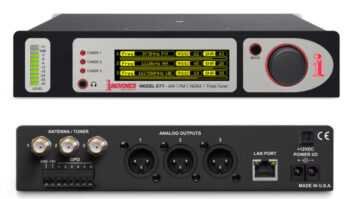At times serious, humorous, serene and complimentary, Ajit Pai sat at the helm of his first open meeting as Federal Communications Commission chairman Tuesday.
He connected his experience as a young radio listener in rural Kansas to his advancement to the FCC chair. And he reiterated his belief that changes to rules governing broadcasting, when they ease unnecessary regulatory burdens, are desirable.
He recalled a visit to KKOW(FM) in Pittsburg, Kansas, a 10,000-watt station he liked as a boy. He recounted asking the staff how often someone from the public came by to peer through the station’s rows of filing cabinets containing letters from the public; he said his question was met with laughter.
“I was the first that anyone could remember, and members of the staff had been there quite some time,” Pai said in an opening statement.
During the meeting, the commissioners voted 3–0 to drop the correspondence file requirement. That move was applauded by the National Association of Broadcasters, which praised the FCC for eliminating this “archaic” rule. (“The order serves as a strong demonstration of Chairman Pai’s commitment to curtailing burdensome regulations that hinder broadcasters’ ability to operate, create jobs and serve the public interest,” the NAB stated.)
That priority may help define Pai’s work as the 34th chairman. He has sounded the theme before. “The regulatory underbrush at the FCC is thick,” he said in a speech to the Free State Foundation in December. “We need to fire up the weed whacker and remove those rules that are holding back investment, innovation and job creation.” Though the correspondence file order was seen as noncontroversial, it aligns with the chairman’s stated goals of modernizing rules and reducing regulatory burdens on commercial broadcasters without adversely affecting the public interest.
After he adjourned the relatively short formal portion of the meeting, Pai took questions from reporters, joking that now that he was chairman, the one thing he would miss was “having Commissioner O’Rielly next to me at press conferences to handle the hard questions I can’t answer.”
He said the commission is in the process of reviewing all items left pending from Chairman Tom Wheeler’s administration, which he called standard operating procedure. He reiterated that one of his main priorities as chairman would be to close the “digital divide” in America. In recent days Pai has met with a number of consumer groups and broadband providers about ways to better connect unserved parts of rural America. The FCC also announced that the commission plans to establish a Broadband Deployment Advisory Committee (PDF) to tackle those issues.
When asked how aggressive he will be in terms of using his authority as chairman to scale back regulations, Pai said that it is incumbent on the FCC and any agency to make sure regulations match the times. “If there are outmoded regulations that are in the way, it doesn’t serve consumers to keep them.”

Pai demurred when asked about specific process reform plans and whether he has been in talks with the White House about delegating some FCC functions to other agencies. He said he has not made any determination with respect to process reform at this time, nor had any conversations with the White House about the issue.
The chairman also instituted a new rule under which each commissioner will individually say “yes” or “no” as opposed to “all in favor say aye,” to make it clear to the public how commissioners are voting. Separately, in a procedural matter, Pai was appointed as the FCC’s defense commissioner, a position that directs the homeland security, national security and emergency preparedness and defense activities of the commission. Much of that work involves representing the FCC to other federal agencies and being its principal point of contact with the Department of Homeland Security.
Pressed by reporters to clarify his comments on certain issues such as net neutrality, future auctions, corporate mergers, the Open Internet and TV ownership rules, he circled back to earlier comments. “You can see what I said in the past,” and “I would refer you to the comments I made before.”
After praising colleagues Commissioners Mignon Clyburn and Michael O’Rielly, Pai said that his outlook as chairman is relatively straightforward. “My philosophy is simple. Follow the law, make a diligent search for the facts, and take the appropriate action necessary to protect the public interest. I can’t put it more simply than that.”












